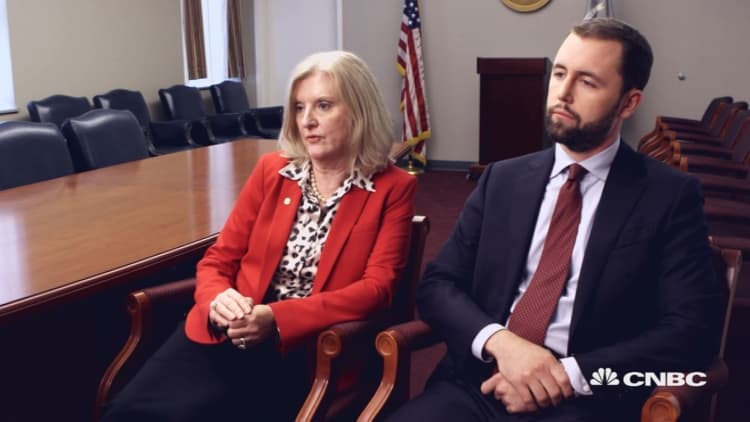
Think Nigerian scams are unsophisticated? Think again!
In the past, con artists from Nigeria often pretended to be princes in trouble to get your personal information. Now they use more refined scams to rake in millions.
"What these are, are really finely tuned, sophisticated schemes that are targeted to separate you from your money," said Mark Nunnikhoven, vice president of cloud research at cybersecurity company Trend Micro. They recently released a report on West African cybercrime, which includes Nigeria.
Prosecutors in Gulfport, Mississippi, recently took down one Nigerian crime ring that brought in $52 million.
For one former government agent, that scam began with a woman showing up at his door.
"I was overseas on a government assignment. … I got a call from my wife that someone had come onto our property looking for me," said the agent, who spoke to CNBC on the condition of anonymity. "The person told my wife that she had met me with my name" on a dating website.
That woman drove miles to a rural town to meet a man she had never met, but believed she was in love with. Others sent letters.
"They were asking, 'why aren't I hearing from you? Where are you? What do you want me to do with the clothes, with the laptop I purchased?" he said.
The former agent's name and location were used to reel in people looking for love all across the country. It all began with scripts blasted out on dating websites.
"The same language was used with one person after another … it didn't matter if it was male or female," said Annette Williams, an assistant U.S. attorney with the Southern District of Mississippi, who prosecuted the case.
The scripts had a specific target in mind.
"These type of transnational criminal organizations solicit their victims between the ages of 45- 75, widowed men and women. They choose these individuals because they are lonely, [and] in most occasions, they have access to money," said Todd Williams, an agent with Homeland Security Investigations.
The messages told the story of a U.S. citizen who was abroad for work and looking for love.
Here is how they read:
"Am totally new to this online dating stuff…"
"Am in West Africa for a particular contract but would be getting that accomplished in a couple of week…"
"We should be able to take this relationship to another level when i get home."
After a relationship was established, the con artists began asking for favors.
"I want you to assist me pay the bill," one note asked.
That's what happened to N.J., who asked CNBC to identify her by her initials.
"He asked me about my family and I asked him about his. … It was like … if he was here and we knew each other," she said. "How you would talk with a boyfriend."
N.J.'s online boyfriend sent her a box of phones and asked her to mail them to Africa. That's when she got suspicious and called police.
"That one phone call took down this massive fraud network," said Conor Mulroe, a Department of Justice trial attorney, who prosecuted the case.
N.J. was not alone. The Nigerian crime ring created a network of what investigators call electronic-mules, or e-mules, across the U.S. These victims unwittingly helped carry out a bunch of money-making schemes, like cashing fake checks and shipping goods bought with stolen credit cards. Ultimately the proceeds were wired back to Africa.
"It probably moved through four different hands before something went overseas," Annette Williams said.
The Nigerian criminals were living large for local standards, both at home in Nigeria and in South Africa, where many of the students were living on student visas.
"That they had cars that other students didn't have, they had the watches and all of that, and they threw a lot of parties," Annette Williams said. "They had no jobs, they had no source of income other than these scams."
At the same time, victims in the U.S. were suffering. "We have victim statements where people lost their homes," Annette Williams said.
Others faced financial ruin. "Many of the victims targeted with counterfeit checks, this episode just sent them into a financial spiral that they're still dealing with," Mulroe said.
The crime ring was brought to justice. Investigators worked with South Africa and Canada to extradite those responsible. Twelve pleaded guilty and were sentenced to up to 20 years in prison. Three were found guilty at trial and received sentences of up to 115 years in prison. Four defendants remain fugitives, with three last known to be in Nigeria.
Crime rings like this one have raked in $2 billion, according to Trend Micro and that's expected to increase as West Africa, the region that includes Nigeria, is considered the new cybercrime hotbed.
"Over the last three years, we've seen a steady increase in cybercrime coming from the region. Because they've been making money hand over fist with relatively little risk to themselves," Nunnikhoven said.
While other West African crime rings exist and often use these romance ploys, this ring also had two scams that were unique, one involving college textbooks, the other prepaid credit cards.
"They not only would purchase the textbooks with compromised credit cards, but in most instances, within 48-72 hours from purchasing the textbooks, they would actually sell the textbooks back to the same textbook company online that they stole the books from. So essentially these textbooks companies were getting the merchandise stolen from 'em. And in the end, they were spending their own money to purchase their own merchandise back," said Todd Williams, the Homeland Security agent.
For the textbook scam, the group targeted family owned businesses and many went out of business.
"We were able to identify that they would not be able to stay open for more than just a few months before they'd have to shut down their business," the agent said.
The scheme shocked prosecutors, with Annette Williams calling it the most brazen.
As the crime ring operated, they began to get more sophisticated and relied on prepaid cards to move money, instead of e-mules.
"It would all start where they would purchase compromised credit card data. … They would create thousands of American Express Serve prepaid accounts. Once they were able to acquire those accounts, that in turn would become their infrastructure that they needed to be able to move their illicit proceeds," said Todd Williams.
That part of the scheme cost American Express $1.6 million, according to a statement by prosecutors.

They are far from the only company to get scammed by West African nationals.
"With big businesses we see the same type of scam, but perpetrated on a much larger scale. So, what the criminals try to do instead of hook you with that relative that needs help or that Nigerian prince, what they're now doing is trying to spoof the CEO to the CFO," Nunnikhoven said. "We're seeing far more manufacturers be targeted, simply because they do business with a lot of small companies. So, the criminals can easily pretend to be one of these companies."
Unlike cybercriminals in Eastern Europe and Asia, West African criminals tend to have less technical expertise. Instead, they use mind games.
"This region is far more focused on that social con, on that trick … when it comes to social crime, it's a finesse. It's an art," said Nunnikhoven.
To protect yourself from West African schemes, investigators warn not to get involved financially with anyone you have not met in person. Also, check your credit score, bank and credit card statements for unapproved accounts and transactions.
These four defendants remain at large, three with last known locations in Nigeria.



